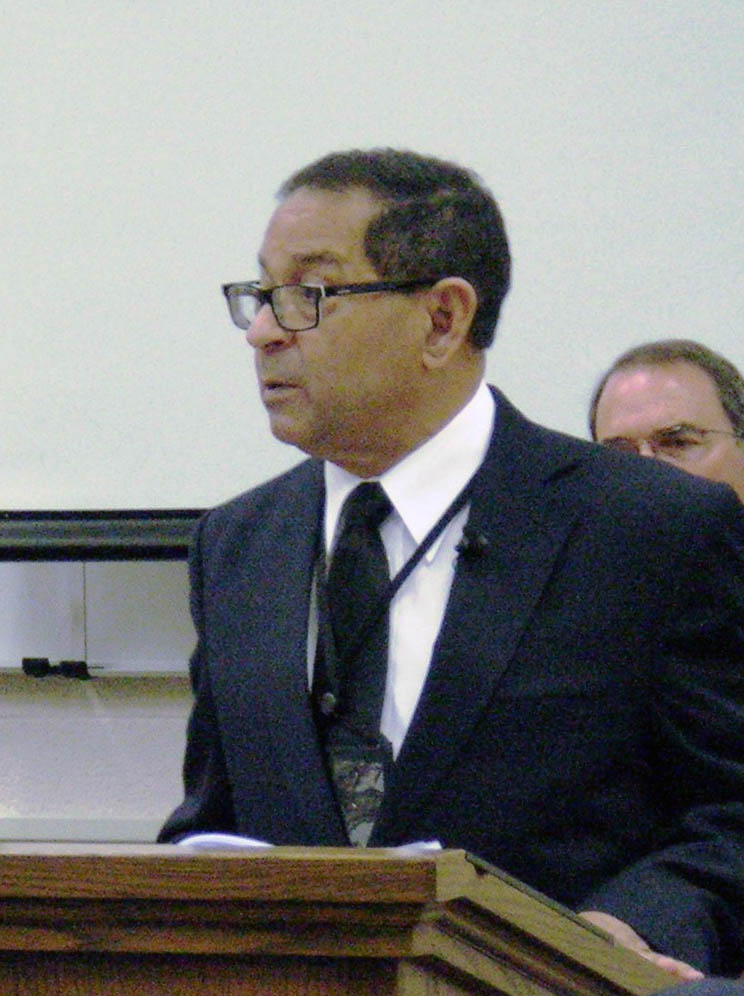Symposium 2015: Judicial Perspectives – Mariano Germán Mejía, Chief Justice of the Supreme Court of the Dominican Republic

Reported by Jordan Pendergrass
Mariano Germán Mejía, Chief Justice of the Supreme Court of the Dominican Republic, was the symposium’s second presenter in a series on the judicial perspective of law and religion. He discussed how the Dominican Republic, a nation with more than 90% of the population identifying as Roman Catholic, has benefited greatly from a marriage of law and religion. The Chief Justice expressed confidence that law and religion will never be divorced in the Dominican Republic.
Chief Justice Germán Mejía provided background on his nation’s history and spoke about the difference between the formative experiences of Haiti and the Dominican Republic. Despite similar geographical features between the two countries of Hispaniola, the Dominican people have developed a distinct identity that is conducive to acceptance of the role of religion in civil society. He noted several revisions to the Constitution, including the significance of amendments in 2010, but made clear that the Catholic Church has consistently enjoyed a privileged position. He emphasized the prominence of faith as displayed on the national flag and seal and in judicial buildings. The Chief Justice described how the nation’s homogeneous population has allowed the influence of faith to remain relevant to government. According to the Chief Justice, religious liberty with certain limits is guaranteed; however, it is practically unnecessary.
Much of the session was devoted to extolling the social benefits of harmonizing law and religion. Many benefits were cited: respect, honesty, cooperation, family and social stability, responsibility, the reduction of conflict, etc. All of these benefits lead the Chief Justice to ask, “Why not have religion?” To put his message into context, he described himself as a Catholic judge who has personally witnessed the positive effects of faith on family and society.
A question and answer session followed the prepared remarks. A delegate from the Philippines made the comparison between the experiences of his country and the Dominican Republic, and inquired about the role of the penal code and the respect for the civic institutionalism of Christianity. Another delegate inquired about the position of non-Christians in society. The session was moderated by Judge Jay S. Bybee of the United States Court of Appeals for the Ninth Circuit.
Chief Justice Mariano Germán Mejía Jiménez was appointed President of the Supreme Court of Justice of the Dominican Republic by The National Council of Magistrates in 2011. Prior to this, he served as Attorney General and as the Director of the Instituto Dominicano de las Telecomunicaciones. He has served on various committees responsible for updating national zoning codes and civil procedure. He is an esteemed professor and author of the book, Vías de Ejecución, which is an analysis on the various paths leading to capital punishment.
The Twenty-second Annual International Law and Religion Symposium took place at the J. Reuben Clark Law School on the Campus of Brigham Young University in Provo, Utah. The delegates—approximately 90 leading scholars, jurists, and political and civil society leaders from 40 countries—joined in an exploration of issues surrounding the theme Religion, Law, and Social Stability.